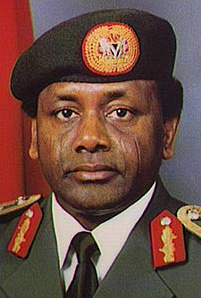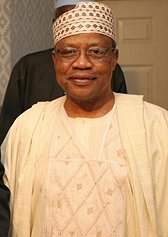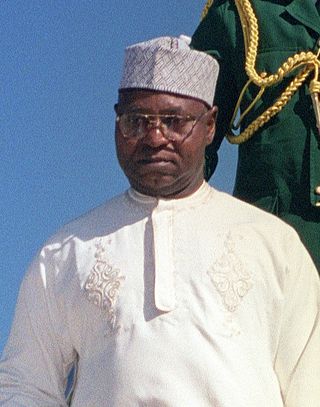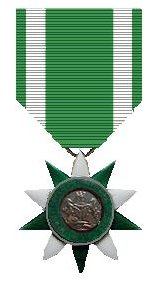
Sani Abacha ; was a Nigerian Army General and politician who ruled as the military head of state after seizing power in 1993 until his death in 1998. Abacha's seizure of power was the last successful coup d'état in Nigerian military history.

The president of the Federal Republic of Nigeria is the head of state and head of government of the Federal Republic of Nigeria. The president directs the executive branch of the federal government and is the commander-in-chief of the Nigerian Armed Forces.

Ibrahim Badamasi Babangida is a Nigerian retired general and statesman who served as military president of Nigeria from 1985 until his resignation in 1993. He rose through the ranks to serve from 1984 to 1985 as Chief of Army Staff, going on to orchestrate his seizure of power in a coup d'état against Muhammadu Buhari.

Joseph Nanven Garba was a Nigerian general, diplomat, and politician who served as president of the United Nations General Assembly from 1989 to 1990. He served as federal commissioner for external affairs from 1975 to 1978, commandant of the Nigerian Defence Academy from 1978 to 1979 and commander of the Brigade of Guards from 1968 to 1975.

The military dictatorship in Nigeria was a period when members of the Nigerian Armed Forces held power in Nigeria from 1966 to 1999 with an interregnum from 1979 to 1983. The military was able to rise to power often with the tacit support of the elite through coup d'états. Since the country became a republic in 1963, there has been a series of military coups in Nigeria.
Paul DikeMSS DSS fwc is a retired air chief marshal of the Nigerian Air Force, who was the Chief of the Air Staff from 2006 to 2008. In August 2008, he was appointed Chief of the Defence Staff. Prior to his appointment as Chief of the Air Staff, Dike was Air Officer Commanding Tactical Air Command. Appointed Commander of the Presidential Air Fleet in 1997 by military dictator General Sani Abacha, he was appointed Chief of Air Staff by General Olusegun Obasanjo's civilian government in 2006.
Donaldson Oladipo Oyeyinka Diya, ; 3 April 1944 – 26 March 2023) was a Nigerian general and lawyer who served as Chief of General Staff under military head of state General Sani Abacha from 1994 until his arrest for treason in 1997. He also served as Chief of Defence Staff and as military governor of Ogun State from January 1984 to August 1985.

Abdulsalami Abubakar is a Nigerian statesman and retired Nigerian army general who served as the military head of state of Nigeria from 1998 to 1999. He was also Chief of Defence Staff from 1997 to 1998. He succeeded General Sani Abacha upon the latter's death.
The 1966 Nigerian counter-coup was the second of many military coups in Nigeria. It was masterminded by Lt. Colonel Murtala Muhammed and many northern military officers. The coup began as a mutiny at roughly midnight on 28 July 1966 and was a reaction to the killings of Northern politicians and officers by some soldiers on 15 January 1966. The July mutiny/counter coup resulted in the murder of Nigeria's first military Head of State General Johnson Aguiyi-Ironsi and Lt Colonel Adekunle Fajuyi in Ibadan by disgruntled northern non-commissioned officers (NCOs). Upon the termination of Ironsi's government, Lt. Colonel Yakubu Gowon was appointed Head of State by the coup conspirators.
Dominic Obukadata Oneya was Administrator of Kano State, Nigeria from August 1996 to August 1998 during the military regime of General Sani Abacha, then Administrator of Benue State from August 1998 to May 1999 during the transitional regime of General Abdulsalami Abubakar, handing over power to the elected executive governor George Akume on 29 May 1999. Later, he became Chairman of the Nigeria Football Association.
Yakubu Mu'azu was Administrator of Sokoto State, Nigeria from 9 December 1993 to 22 August 1996.
Abdullahi Mohammed is a retired Nigerian Army major general, who served as chief of staff to presidents Olusegun Obasanjo and Umaru Musa Yar'Adua from 1999 to 2008; National Security Adviser to General Abdusalami Abubakar from 1998 to 1999; Director General of the National Security Organization from 1976 to 1979; and Governor of Benue-Plateau State, Nigeria from July 1975 to February 1976 during the military regime of General Murtala Mohammed.
Colonel (retired) Jibril Bala Yakubu was the first Administrator of Zamfara State after it was created from part of Sokoto State in October 1996, holding office until the return to democracy in May 1999 during the military regimes of Generals Sani Abacha and Abdulsalami Abubakar. As Zamfara administrator, Yakubu created five Emirates in the state and eleven new District Councils. After handing over to the civilian governor Ahmed Sani Yerima in May 1999, as a former military administrator he was required to retire from the army.
Patrick Aziza was the first military Governor of Kebbi State, Nigeria after it was split off from Sokoto State on 27 August 1991 during the military regime of General Ibrahim Babangida.

The Order of the Federal Republic (OFR) is one of two orders of merit, established by the Federal Republic of Nigeria in 1963. It is senior to the Order of the Niger.
Ishaya Rizi Bamaiyi, is a retired Nigerian Army lieutenant general who served as Chief of Army Staff from 1996 to 1999 during the military regime of Generals Sani Abacha and Abdulsalami Abubakar. His older brother was Major General Musa Bamaiyi, former Head of the National Drug Law Enforcement Agency (NDLEA).

Al-Amin Musa Daggash is a retired Air Marshal of the Nigerian Air Force who served as the 7th Chief of the Nigerian Defence Staff from 1998 to 1999 under the General Abdulsalami Abubakar regime.

Lieutenant general, is the second-highest rank of the Nigerian Army and generally it is the highest active rank as the Nigerian army do not have any appointment in the rank of full general but in the case of the appointment of Chief of Defence Staff, the rank of full general is given. It is the equivalent of a multinational three-star rank.











